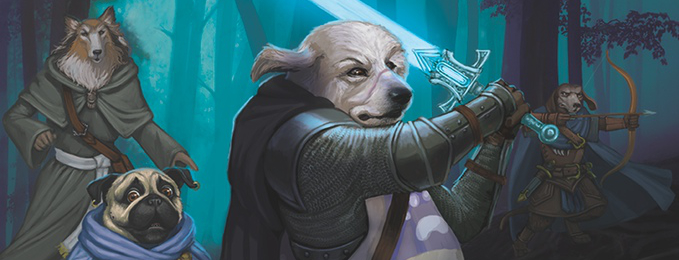I recently found out about the RPG Pugmire and that it’s being localized to Japanese by Group SNE, the makers of Sword World. Not being familiar with Pugmire, I started looking for more info and stumbled upon tweets by its translator Yuli Bethe. There’s a number of interesting tweets, but one I found particularly interesting was a discussion about how to translate the word “lover” into Japanese. This probably seems like a straightforward thing to translate, but it’s deceptively complicated and really illustrates the problems translators face.
For those of you, like me, who hadn’t heard of Pugmire, it’s an RPG that adapts 5e’s SRD to a world of uplifted dogs. Humans have long since vanished, but dogs and other animals have inherited the world.
Now why would translating “lover” be potentially problematic in that setting? In Japanese, the most common ways of writing “lover” (such as 恋人) include the character for “human” (人). That’s all well and good except the fact that in Pugmire humans are extinct and it’s a world of animals.
The following is a rough translation of the original tweet and its thread:
Yuli Bethe: A lot of words have cropped up while translating Pugmire. Translating the love between dog comrades (which is fairly on the free love side) is hard. "Lover" (恋人, love + human) can't be used, so I went with "Lover" (恋犬, love + dog). It's ok to use a reading of "koiinu", right? lol
Yuli Bethe: Oh, but to be correct it's not quite free love. It eschews a system of marriage that is defined by male and female, and it's not monogamy, either. Culturally dogs avoid making children with dogs belonging to another house (especially in the case of royalty).
engawa_nite: If you do that, "Beloved Dog" (愛犬) probably takes on the nuance of "mistress" (愛人)?
Yuli Bethe: Yeah, I originally translated it as "Beloved Dog" (愛犬) and thought, "shit! that's adultery" lol
@Quesera0108: "Lover" (恋人, love + human) is using Japanese readings for both characters, so "koiinu" is fine, right?
@Mr_mussyu00: A dog's Lover? The expression "mated animals" (番) immediately came to mind at first, but... "koiinu" is cute! lol
Yuli Bethe:It's not mates, but lovers, so I didn't want to translate it as "a pair of mated animals" (番).... (bitter smile)
@Mr_mussyu00: Ah, in English it's that type of difference. I totally understand now.
@WyremGF: In Xanth they use "animal love" (恋畜) -> that somehow feels a bit perverse.
They're beasts, so "beast love" "恋獣" -> that emotionally intense!
Another way to refer to dogs is dog ("恋狗", 狗 is an alternate character for dog) and dog ("恋戌", 戌 is another way to write dog) -> that's hard to distinguish from dog comrades.
This is difficult, isn't it.
Yuli Bethe: They're dogs, not beasts. Speaking of love, the dog's humanity is part of the appeal of Pugmire.
@WyremGF: Right! They're the apex of intelligent life in that world.
@aotukiookami: I'm not sure if this is the correct nuance, but it appears that "partner" is starting to become used for both "lover" and "companion" in Japan? You could do something like writing "dog love" (恋犬, love + dog) but use a reading of "partner"? How about creating a non-traditional reading?
@Tirthika: If you want to avoid expressions that use "human" (人), how about something like "one's husband/wife" (連れ合い)?
Really looking forward to getting my hands on a copy of it and seeing how they end up translating it.


I also don’t know much about Pugmire. But it seems interesting!!
I can kind of relate with the translator there as I’ve worked in translations before.
Yeah, from the little bit I’ve done I can relate as well. What type of translations have you done?
Mostly college/university papers and videos and short movies subtitles on a freelancer capacity. To and from Portuguese.
Thanks for posting this! As the creator of Pugmire, I’m overjoyed that people are doing their best to make it such a great game. 🙂
Congratulations, both on the success of Pugmire and its localization to Japanese! I recently picked up the TRPG magazine Warlock that has you interview from Gencon in it, and am looking forward to reading it. 🙂